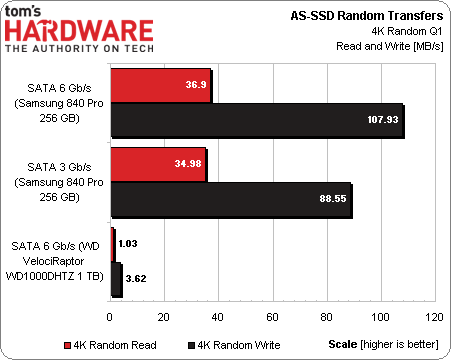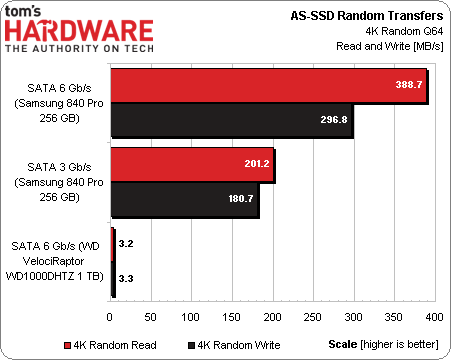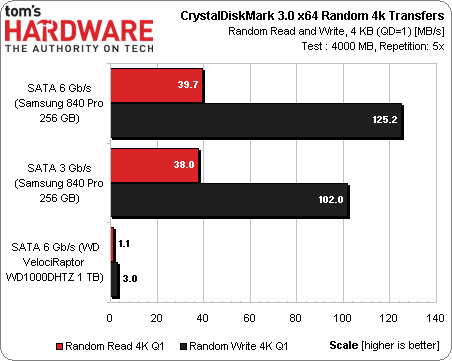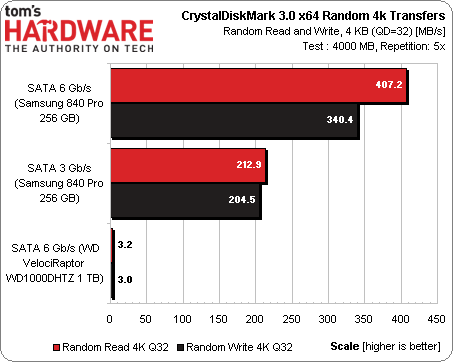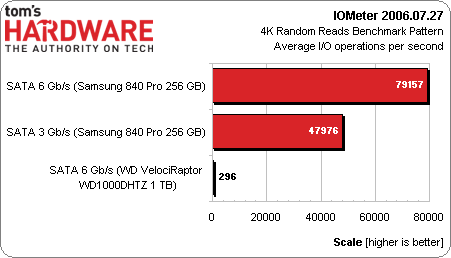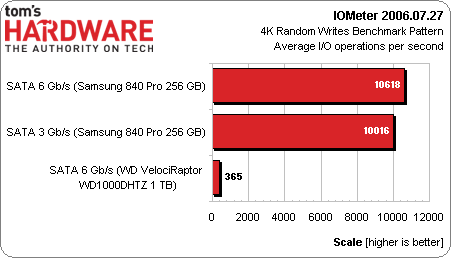Is A SATA 3Gb/s Platform Still Worth Upgrading With An SSD?
Today's fastest SSDs already bounce off the SATA 6Gb/s interface's throughput ceiling. Does a 3 Gb/s link kill the performance of those drives? We run a number of synthetic and real-world tests to assess the damage when you upgrade an older platform.
Results: 4 KB Random Read And Write Performance
AS-SSD: 4 KB Random Reads and Writes
This benchmark is the most important for real-world performance, and the fastest hard drive just can’t compete with an SSD when it comes to 4 KB random reads and writes. Samsung's 840 Pro does a little bit better attached to a 6 Gb/s interface compared to the 3 Gb/s port. Its writes are 20 MB/s faster, while its reads are less than 2 MB/s quicker.
If we push higher queue depths, representing the number of outstanding commands the SSD is being asked to process concurrently, the faster interface does help bolster performance quite a bit. This is largely theoretical, though. No desktop environment is ever going to see queue depths of 32 or more.
With that context, we do see random reads and writes at least 1.5x faster on the 6 Gb/s port.
CrystalDiskMark: 4 KB Random Reads and Writes
CrystalDiskMark’s benchmark numbers tell a similar tale. The advantage of SATA 6Gb/s over the 3 Gb/s standard is relatively small at the low queue depths typical of most desktops, and then larger at the command queues seen in server environments. Again, if you're using a mainstream PC or notebook, you're really only worried about queue depths of one to four.
Iometer: 4 KB Random Reads and Writes
Get Tom's Hardware's best news and in-depth reviews, straight to your inbox.
Iometer’s numbers differ a bit from the other two benchmarks, though the overall message doesn't change. Samsung's 840 Pro does quite a bit better attached to a 6 Gb/s port compared to SATA 3Gb/s, particularly in reads.
Current page: Results: 4 KB Random Read And Write Performance
Prev Page Results: Access Time Next Page Results: 512 KB Random Read And Write Performance-
Combat Wombat Far Out! I didnt realise there was such a big difference between my Raptor, and a Samsung's 840,Reply
Thanks toms, Samsung will get a few hundred out of me next pay day. :P -
nukemaster I have been using an M4(on SATA 3gigabit/sec) on my older media center as a boot drive and for some games. The difference from the hard drive it replaced was massive. The old hard drive is still great for storing media and files.Reply -
DarkSable This... was a kind of stupid test. Of COURSE an SSD is a good thing even on a SATA II connection.Reply
Does Tom's not remember the early days of SSDs, when everyone wanted one and noone could afford one? There was no such thing as SATA III back then, and if SSDs didn't give a benefit, nobody would have payed attention with how expensive they were. -
LordConrad ReplyEven With SATA 3Gb/s, An SSD Makes Sense
I could've told you that. I put a OCZ Vertex 2 in my HP dv6t-2100 laptop a while ago and the difference was like night and day. SATA II is definitely SSD worthy! -
Onus This article measured what was intuitively obvious. My primary system's boot drive is a 3Gb/s mSATA Crucial M4; I've felt no need to upgrade. Just today I put a 128GB 6 Gb/s SSD on an old 790GX board, and the difference is amazing.Reply
-
rdc85 IMO It well worth it, if u had the budget... (even it in sata2 mode)Reply
still the price is the issue...
hope the price will continue to decline, so it became affordable for (most of) everyone.... -
jimmysmitty Combat WombatFar Out! I didnt realise there was such a big difference between my Raptor, and a Samsung's 840,Thanks toms, Samsung will get a few hundred out of me next pay day.Reply
Any SSD on 3Gb/s kill Raptors outright. Even my older X25-M does due to the sheer IOPS compared to a Raptor or any mechanical HDD.
I do need to upgrade but not for the speed, mostly for size. 80GB is not enough even for OS and a few apps. I have messed with everything from a SATA II SSD to a PCIe SSD (Revo 3) and as long as you are on SATA II or better its going to be more than fast enough.
But that said, I might just wait for Broadwell and SATA Express. -
mayankleoboy1 1. This test feels kind of incomplete. What i felt was the right comparison was to add a native SATA2 SSD on a SATA2 port, and then compare it to a SATA3 drive on a SATA2 port.Reply
2. The startup and shutdown times will increase once you start adding softwares to the system. Specially, an Antivirus (kaspersky internet security) makes me weep on startup on a mechanical disc.
3. Kind of stupid question : Will overclocking the CPU improve the startup/shutdown times, now that the storage bottleneck is largely removed ?
4. Can we have the time taken by each system to install all the Windows updates, just after the fresh install ? -
coolbz DarkSableThis... was a kind of stupid test. Of COURSE an SSD is a good thing even on a SATA II connection.Does Tom's not remember the early days of SSDs, when everyone wanted one and noone could afford one? There was no such thing as SATA III back then, and if SSDs didn't give a benefit, nobody would have payed attention with how expensive they were.Reply
This article does give very important guideline, where people evaluate different upgrade options. Conclusion is, you don't need to replace a SATA2 computer with SATA3 computer for the mere of SSD speed benefit.
